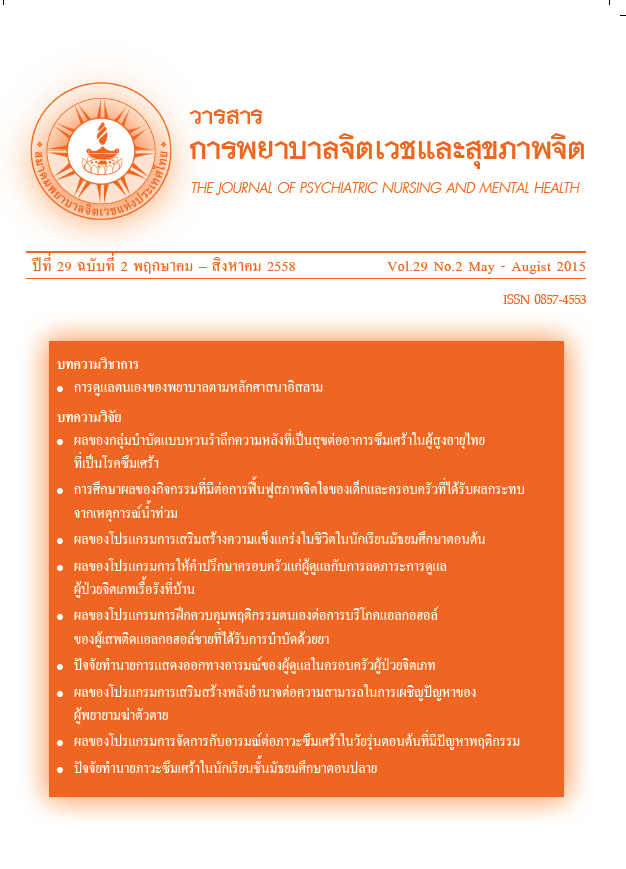ผลของโปรแกรมการจัดการกับอารมณ์ต่อภาวะซึมเศร้าในวัยรุ่นตอนต้นที่มีปัญหาพฤติกรรม THE EFFECT OF THE EMOTIONS MANAGEMENT PROGRAM ON DEPRESSION IN EARLY ADOLESCENTS WITH BEHAVIORAL PROPBLEMS
Main Article Content
บทคัดย่อ
Objectives: The purposes of this quasi-experimental research using pretest-posttest design were: 1) to compare depression in early adolescents with behavioral problems before and after receiving emotions management program, and 2) to compare depression in early adolescents who received the emotions management program and those who received regular caring activities.
Methods: Forty of early adolescents with behavioral problems at one particular school located in Singburi province, who met the inclusion criteria, were matched pair and then randomly assigned into experimental group and control group, 20 subjects in each group. The experimental group received the emotions management program which composed of 8 group activities to improve relevant skills including relaxation, positive coping, cognitive-behavioral skills, social skills management and communication. The control group received regular caring activities. Research instruments were: 1) the emotions management program, 2) Children’s Depression Inventory, and 3) The Strengths and Difficulties Scale. All instruments were validated for content validity by 5 professional experts. The Cronbach’s alpha reliability coefficients of the two latter instruments were .88 and .85, respectively. The t-test was used for data analysis.
Results: Major findings were as follows: 1) After receiving the emotions management program, early adolescents with behavioral problems had significantly lower depression scores than that before (p < .05). 2) After the experiment, early adolescents with behavioral problems who received the emotions management program had significantly lower depression scores than those who received regular caring activities (p < .05).
วัตถุประสงค์: การวิจัยกึ่งทดลองแบบสองกลุ่มวัดสองครั้งก่อนและหลังการทดลองนี้ มีวัตถุประสงค์ เพื่อ 1) เปรียบเทียบภาวะซึมเศร้าในวัยรุ่นตอนต้นที่มีปัญหาพฤติกรรม ก่อนและหลังได้รับโปรแกรมการจัดการกับอารมณ์ 2) เปรียบเทียบภาวะซึมเศร้าในวัยรุ่นตอนต้นที่มีปัญหาพฤติกรรม ระหว่างกลุ่มที่ได้รับโปรแกรมการจัดการกับอารมณ์กับกลุ่มที่ได้รับการดูแลตามปกติ
วิธีการศึกษา: กลุ่มตัวอย่างคือ วัยรุ่นตอนต้นที่มีปัญหาพฤติกรรม จากโรงเรียนแห่งหนึ่งในจังหวัดสิงห์บุรี และมีคุณสมบัติตามเกณฑ์ จำนวน 40 คน ทำการจับคู่แล้วสุ่มเข้ากลุ่มทดลอง และ กลุ่มควบคุมกลุ่มละ 20 คน กลุ่มทดลองได้รับโปรแกรมการจัดการกับอารมณ์ที่ผู้วิจัยสร้างขึ้น ประกอบด้วยการดำเนินกลุ่ม 8 ครั้ง เพื่อพัฒนาทักษะที่เกี่ยวข้อง ได้แก่ การผ่อนคลาย การปรับความคิดและพฤติกรรม ทักษะทางสังคม ทักษะการสื่อสาร ทักษะการแก้ปัญหาและการเจรจาต่อรอง ส่วนกลุ่มควบคุมได้รับการดูแลตามปกติ เครื่องมือที่ใช้ในการวิจัย คือ 1) โปรแกรมการจัดการกับอารมณ์ 2) แบบวัด ภาวะซึมเศร้าในเด็ก และ 3) แบบประเมินปัญหาพฤติกรรม ซึ่งผ่านการตรวจสอบความตรงเชิงเนื้อหาจากผู้ทรงคุณวุฒิ จำนวน 5 ท่าน โดยเครื่องมือสองชุดหลัง มีค่าความเที่ยงสัมประสิทธิ์แอลฟ่าของครอนบาคเท่ากับ .88 และ .85 ตาม ลำดับ วิเคราะห์ข้อมูลโดยใช้สถิติทดสอบที (t-test)
ผลการศึกษา: ผลการวิจัยสรุปได้ดังนี้ 1) ภาวะซึมเศร้าในวัยรุ่นตอนต้นที่มีปัญหาพฤติกรรม หลังได้รับโปรแกรมการจัดการกับอารมณ์ต่ำกว่าก่อนได้รับโปรแกรมการจัดการกับอารมณ์อย่างมีนัยสำคัญทางสถิติที่ระดับ .05 2) ภาวะซึมเศร้าในวัยรุ่นตอนต้นที่มีปัญหาพฤติกรรม กลุ่มที่ได้รับโปรแกรมการจัดการกับอารมณ์ต่ำกว่ากลุ่มที่ได้รับการดูแลตามปกติอย่าง มีนัยสำคัญทางสถิติที่ระดับ .05
Article Details
บทความที่ได้รับการตีพิมพ์แล้ว เป็นลิขสิทธิ์ของสมาคมพยาบาลจิตเวชแห่งประเทศไทย


